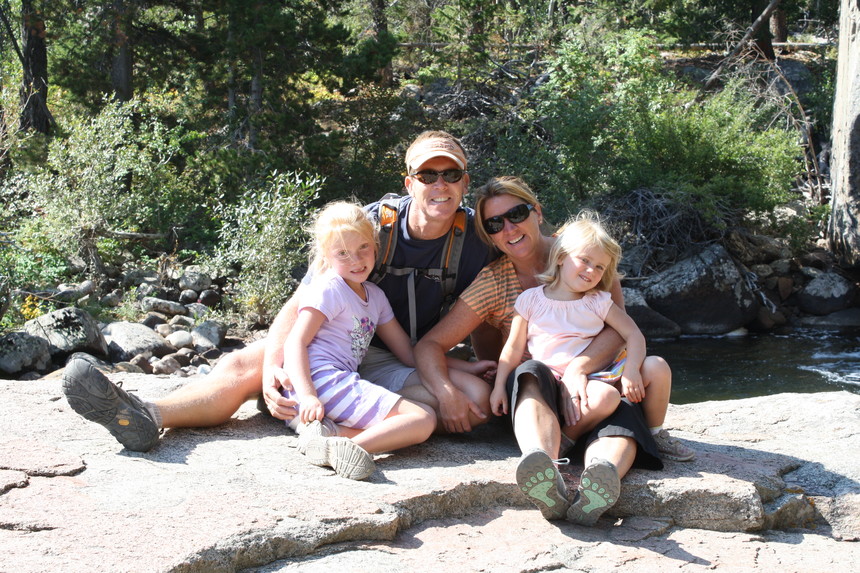
Mountain in the Hallway
Story by Leslie HittmeierI wish I could end this story in a happy way. I wish I could close the box, wrap it up, and tie a nice, neat bow on it, but I can’t. That’s not how cancer works. That’s not how life works.
On a sunny July morning at the Lupine Meadows trailhead in the Tetons, two men are hugging. Brian McDonnell, 49, looks strong. His trekking poles and a stuffed 30-liter climbing pack are at his feet. Tate MacDowell, 36, looks tired. He is dressed in khaki shorts, a black cotton T-shirt, and Nikes. He’s moving slow, and every step looks like it hurts. Both men are in tears. Although this is the first time they have met face to face, they’ve been texting each other for support during their year-long journeys with cancer.
A year ago, Brian and Tate’s mutual friend, TGR co-founder Todd Jones, introduced them via e-mail. They had both been diagnosed with colorectal cancer at the same time and Todd was hoping they could help each other. Since then, they’ve been doing just that, texting regularly about the gross realities of colon cancer that only someone going through it could understand. They talk about things like the grueling side effects of chemotherapy and radiation, their shared the repulsiveness of going to the bathroom in a bag for seven months, and the elation from a day that was slightly less painful than the day before.
Today, they are supposed to be hiking to the Lower Saddle of the Grand Teton in hopes of summiting together tomorrow. They’re both in remission, and the climb was meant to be a celebration. But Tate can’t go. He’s been dealing with a bowel infection that just won’t quit so he has decided to stay behind. Tate is beyond disappointed. He has been waiting for this for a really, really long time. He first decided to try to climb the Grand back in August 2016 after seeing a picture of it on the wall in his radiation treatment center every day for six weeks.
Tate walks with us for about a mile as our guides, Chris Figenshau and Ben Hoiness, lead us down the trail. He walks until he can see the Grand looming in the distance, seven miles away and 7,000 feet up. He and Brian hug goodbye and then Tate turns back toward the parking lot.
Brian doesn’t care about the summit itself, especially now that Tate isn’t joining him. It was supposed to be this great symbolic feat that they would complete together. The only reason he is continuing without Tate is that when you just spent a year of your life writhing in pain, lying in hospital beds, and shitting liquid fire, you have to take advantage of the days when you feel good. And maybe if he does summit the Grand, it will mean that after a year of fighting to stay alive, the life he had before all of this isn’t too far away.
Brian enjoying a wake surfing session.
The route to the top of the Grand is familiar to Brian. He has summited it five times and has been climbing in the Tetons ever since he and his wife Jen wandered into Jackson 20 years go. They met in ’96 when Brian took a break from his solo hike of the Appalachian Trail to go to a friend’s wedding in Charlotte, North Carolina. A few days before the wedding, Brian found himself at Jen’s birthday party.
“I told her I was hiking the Appalachian Trail and she was like, ‘I want to come!’ So I told her to get some hiking boots. She joined me in the Smoky Mountains for 14 days,” Brian says.
After finishing the 2,200-mile through hike, Brian packed all his stuff into his car and drove west with plans to work his way across the country to Jackson to eventually climb the Grand. He asked Jen to come with him and she said yes. They camped out of their car for months. When they finally got to Jackson, they never left. Now they live in Victor, Idaho, and own an outdoor-gear rental store in Jackson called Leisure Sports. They have two kids. The elder, Hailey, is a bit more cautious than her mountain-climbing dad. She has a head of strawberry-red hair and a face full of freckles that lights up when she is horseback riding. Eight-year-old Lily is a little wild child, and Brian and Jen suspect she might be the troublemaker in the family.
It was an enviable life: a family of four living and playing in one of the West’s great mountain towns, a successful business, and a lifetime’s worth of adventurous plans in the works. On May 23, 2016, it all changed.
Brian, Jen, Hailey, and Lily on a family outing.
The day started off normal: Brian went to work, attended a meeting for the search-and-rescue team he’s on, grabbed a beer with a buddy, and then went home. He was sitting on the couch watching a basketball game when he felt the urge to go to the bathroom.
“By the time I was sitting down on the toilet, about three cups of blood came out of me,” Brian says.
He called for Jen, who was upstairs with the girls, and she came running down. They went to the ER in Driggs and the next morning Brian was sent to Madison Memorial Hospital in Rexburg, Idaho, for a colonoscopy, after which Dr. Dwayne Hansen gave him the worst news of his life: There was a golf-ball-sized tumor in his colon.
Three days later, Brian was down at Huntsman’s Cancer Institute in Salt Lake City, making a plan.
“It was scary as hell,” he says. “I was like, ‘I’m going to put all my faith in this doctor and I’m going to do this program.’ They gave me a timetable and I just put my head down and plowed through.”
We would just cry and hold hands until we eventually fell back asleep, but the emotions would come flooding in every night.
Brian started chemotherapy and targeted radiation immediately. Every day for six months, his mom would drive him an hour each way from Victor to Idaho Falls and back for it. While Brian and Jen found it easy to distract themselves from their new reality while the sun was up, the nighttime was another story.
“We would just cry and hold hands until we eventually fell back asleep, but the emotions would come flooding in every night,” Jen says.
But Brian kept plowing through. After the first batch of radiation and chemo, he waited for six weeks before a doctor at Huntsman’s took out 12 inches of his colon, part of his rectum, and the tumor.
After surgery Brian went home with what’s called an ileostomy bag. Now that parts of his colon and rectum were gone, he needed to give them time to heal, so his surgeon created an opening in his belly. The end of the ileum (the lowest part of the small intestine) was brought through this opening to form a stoma. In other words, Brian’s bowel movements no longer came out of the body through the rectum and anus; instead, digestive waste left through the stoma and were collected in a bag on the outside of his body. But three days after Brian came home from surgery, things started to go wrong: The bag wasn’t filling. His bowels, for lack of a better description, were sleeping and nothing he ate was getting digested.
“I was throwing up everything, so I went back to the Driggs hospital and I had this drain pump put in,” Brian says.
Eventually these complications led to a 280-mile ambulance ride from Victor to Salt Lake City, a gnarly infection, and a feeding tube.
“That was the first time I started to think that maybe I was going to die,” Brian says. “I would eat, and I would throw it up. Over and over again, just forcing myself to eat and throwing it right back up. I lost 35 pounds.”
But finally, after 17 days, the bag started to fill.
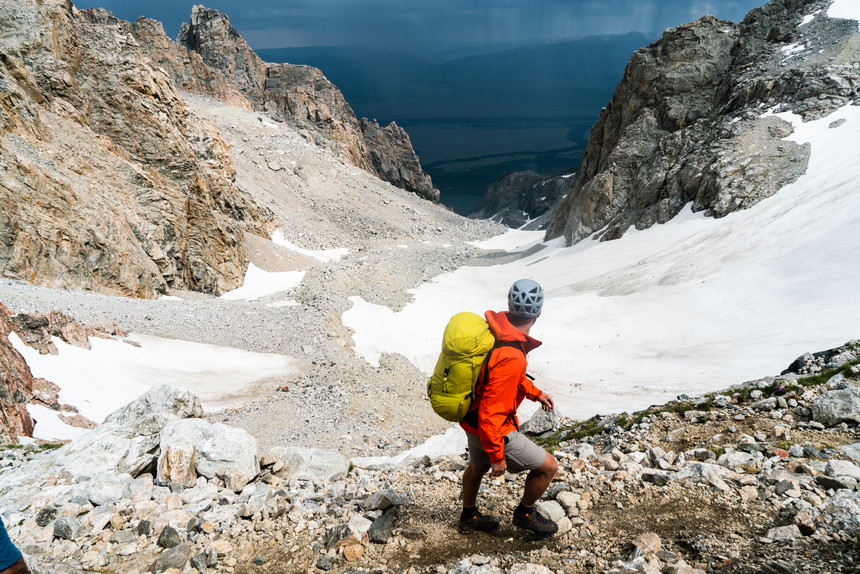
Brian on day one of his climb up the Grand Teton.
We complete the lower switchbacks, get above treeline, weave through the boulder field, and climb more steep switchbacks to the Petzoldt Caves, where we sit down to eat lunch. Brian takes out banana bread and some watermelon. He explains these types of soft foods are all his stomach can digest these days. As a climber and outdoorsman, he probably never imagined he would be lugging three quarters of a watermelon up a mountain. But Brian has to be meticulous about what he eats: One wrong bite of food and this climb is over.
“It takes about a year for your colon to get healthy again after surgery,” he says. “You can’t eat salad, kale; vegetables hurt. I tried to eat hummus once and it tore me up. It’s crazy. Now I basically just eat yogurt, bread, fruit, and plain pasta. That’s what my stomach can handle.”
Ten months ago, Brian was alone in a hospital bed with a feeding tube. Now he’s eating a watermelon at 10,000 feet, surrounded by the very mountains that make him feel most alive. Jen will later tell me that these mountains are Brian’s church, where he goes to clear his head when he is feeling stressed. She says that after going out he always comes home a little more level-headed and happy.
The rest of our day goes by fast and climbing the Grand with Brian doesn’t feel any different than it normally would for me. We keep a good pace and laugh as Brian tells stories about when he used to sling beers at The Mangy Moose, the infamous bar at the base of Jackson Hole Mountain Resort.
I keep expecting him to need to stop or slow down but he doesn’t. I know that his fingers and toes probably feel pins and needles from the permanent neuropathy (nerve pain that typically lingers in one’s feet and hands) he now has thanks to chemo. He once told me that it hurts to reach into the fridge to grab a cucumber; I can’t imagine how it feels to be walking on a pile of uneven rocks at 11,000 feet.
We reach the Exum Guides’ Mountain Hut at the Lower Saddle, where we’ll sleep for a few hours before going for the summit in the morning. From where we are now, there’s just about 2,000 feet of climbing left to do.
I sure wish Tate could be here.
“We made it,” he says, smiling as the hut comes into view. “I was starting to really feel it on that last push there but I feel good. It feels good just to be up here again. I sure wish Tate could be here.”
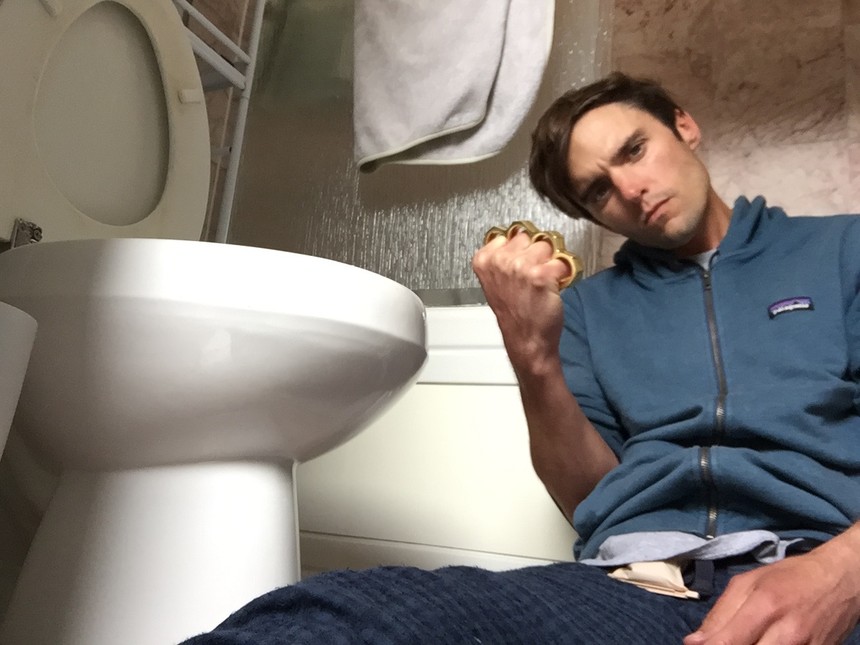
Tate amidst his battle with cancer.
It was August 2016 and Tate had just been diagnosed with stage II rectal cancer, meaning the cancer was growing, but doctors did not think it was spreading into surrounding tissue. He was on his way to the basement of UC San Diego Health in California, where he would be getting targeted radiation on his pelvis every day for six weeks.
“Three people would lay me on a bed and tell me that everything is perfectly safe,” Tate says. “Then they’d run out of the room and close a three-foot-thick metal door behind them while the Death Star shot me in the butt with a laser.”
After treatment, Tate would walk back up the stairs and down a long hallway. At the end of the hallway there was a framed photo of the Grand Teton. At first he didn’t think too much of it, but then he started to wonder.
“I was like, ‘Why is there a picture of the Tetons in California?’ It didn’t make a whole lot of sense so it seemed like there must be something to it,” he says.
Before moving to California in 2010, Tate lived in Jackson for nine years and loved the place. He and his wife Lora even named their son Wilson after the town at the base of Teton Pass. But Tate was a park skier and scared of heights; he had never dreamed of climbing the biggest mountain in the range. Yet every day Tate walked by the photo he became more and more interested in getting to the top of the mountain in it.
“I found myself looking at pictures and watching videos of people climbing the Grand while I was in the waiting room,” Tate says. “My hands would get all sweaty and I would get scared because I’m not into exposure. It was sort of funny. I was sitting in this cancer center that was filled with all these people who were contemplating life and death and I’m sitting here watching YouTube videos and that’s scaring me.”
As radiation got more painful with each passing day, Tate told himself if he could get through his treatments, he could do anything. He texted the main crew of guys he used to hang with when he lived in Jackson and told them he wanted to climb the Grand when he was better. They were in. At that point he’d been talking to Brian a lot, but Brian didn’t think he’d be able to come on the climb since he would still be recovering from surgery.
“Then he texted me one night and was like, ‘They are taking me off chemo,’ and I realized we would be going into our surgeries at the same time,” Tate says. “I asked him if he wanted to do the Grand with us and he said he’d love to.”
As chance would have it, Brian also had a photo of the Grand Teton in the hallway outside his radiation treatment room in Idaho Falls.
“Looking back, there was no way I could have climbed the Grand that day,” Tate says when I talk with him later on in the year. “I couldn’t seem to go a full eight hours without having some sort of issue with my digestion.”
When Tate got home from that abbreviated Teton hike with Brian in July, he learned that his rectal cancer had metastasized into his lungs. He did three more months of chemo (with no results) followed by targeted radiation treatment. But his cancer was stage four and wasn’t letting up.
“The one good thing that has come from this is that you experience everything like you’ve never experienced it before,” Tate says. “Hugs feel better. Talking to your parents feels better, everything. It sucks but at the same time you are so fucking thankful.”
Tate and his family on a trip to Mammoth.
We wake up at 3 a.m. on July 17 and start up the Grand in the dark. The guides say if you don’t get to an obvious band of diorite called the Black Dike about 500 vertical feet from the Lower Saddle in 30 minutes, you should turn around, but Brian is there in 15 and looking strong. We do the first technical bit of rock climbing, a short 40-foot ramp called the Briggs Slab, before heading into the Exum Gully and up Wallstreet, an exposed ledge that leads to the start of the Upper Exum Ridge.
As we begin to climb The Golden Staircase, the sun starts to rise and I can finally see Brian’s smile. We are cruising, and just like the day before I feel as if I’m climbing this mountain with a completely healthy friend, aside from the fact that every half hour someone in our group yells out, “Fuck cancer!” and we all cheer. We climb through Wind Tunnel and up Twin Cracks before heading into a series of pitches whose names carry great weight in Teton Valley: the V Pitch, the Black Hole, and finally the Boulder Problem in the Sky. Brian’s smile never fades.
Although the physical aspects of climbing the Grand with Brian feel normal, reaching the summit doesn’t. As Brian slaps the USGS Benchmark Medallion, he shouts, “Cancer can’t stop me! I waited so long for this. The only good thing about radiation was looking at this mountain in the hallway. This climb proves cancer can’t stop you, can’t slow you down. Thanks to all you guys for helping me get here.”
“I think you kind of did it on your own,” Chris says, smiling.
The mountain in the hallway isn’t just an old poster hung up to make a drab hospital wall more interesting; it’s the ground beneath his feet.
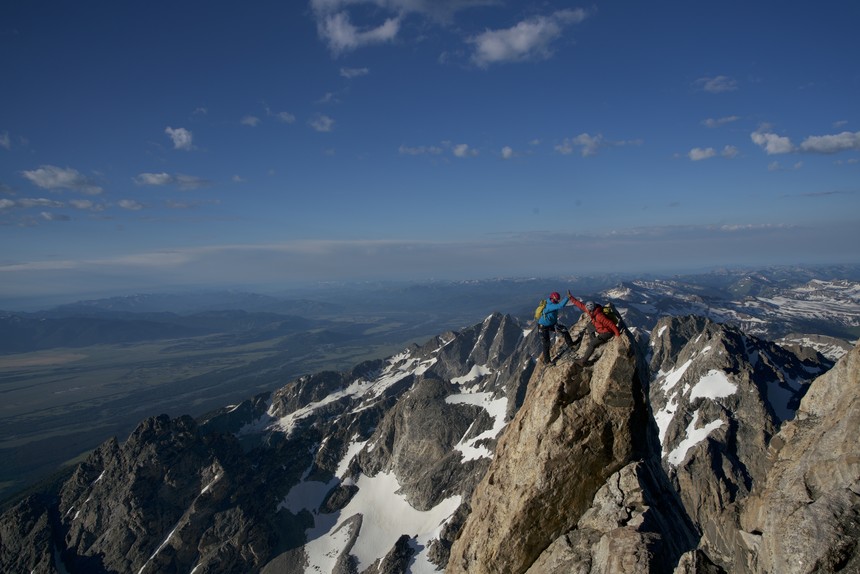
Brian near the top of the Grand Teton.
On a snowy November evening in 2017, I gave Brian a call to see how he’s doing. He sounds tired. In September, two months after our climb, Brian received news that the cancer had metastasized into his liver. He had a liver resection in mid-October and doctors removed 22 percent of it. Normally Brian would be gearing up to go skiing but this year he could only be on his feet for more than a few hours at time.
“How are you feeling?” I asked.
“Surgery was rough,” he said. “But hopefully that’s it. Hopefully it never comes back. They wanted me to do some mop-up chemo now but I’m just not strong enough to even fathom that idea.”
Brian was over it.
“Every time you get the upper hand, something is there to knock you down,” he said. “I thought I was done. I felt so good. I was getting stronger. I was getting better. Things were looking positive. I was like, ‘I’m going to beat this thing,’ and all of a sudden now it’s in my liver. It just comes back. It rears its ugly head somewhere else. It’s an endurance race. It’s a bummer and it’s hard not to let it crush your spirit.”
“I feel like you have to stay positive,” I said. “You can’t go there.”
“You’re right,” he said. “Maybe I’m lying to myself but you have to think positive and stay positive. I just keep telling myself that we got 80 percent the first time and now it’s gone and it’s not coming back. You have to keep telling yourself that.”
Yeah. Everyone keeps saying I’m so tough but I really don’t have a fucking choice. I wake up and I’m not dead yet so I just have to keep dealing with it.
Brian was getting stronger again. He told me about how he’d gone ski touring up toward Targhee and skinned for three miles. It was beautiful. The sun was out, the fresh air smelled good, and the mountains were stunning.
“That’s amazing,” I said.
“Yeah. Everyone keeps saying I’m so tough but I really don’t have a fucking choice. I wake up and I’m not dead yet so I just have to keep dealing with it.”
Our call was suddenly cut short. Hailey fell off the tightrope at school and Brian had to go get her. Life goes on.
I wish I could tell you that Brian is 100 percent healthy. I wish I could close the box, wrap it up, and tie a nice, neat bow on it, but I can’t. That’s not how cancer works. That’s not how life works. Brian hoped that climbing the Grand would be a step toward getting his old life back. But in life, we can never go back—we can only go forward, and Brian’s story isn’t anywhere near over.
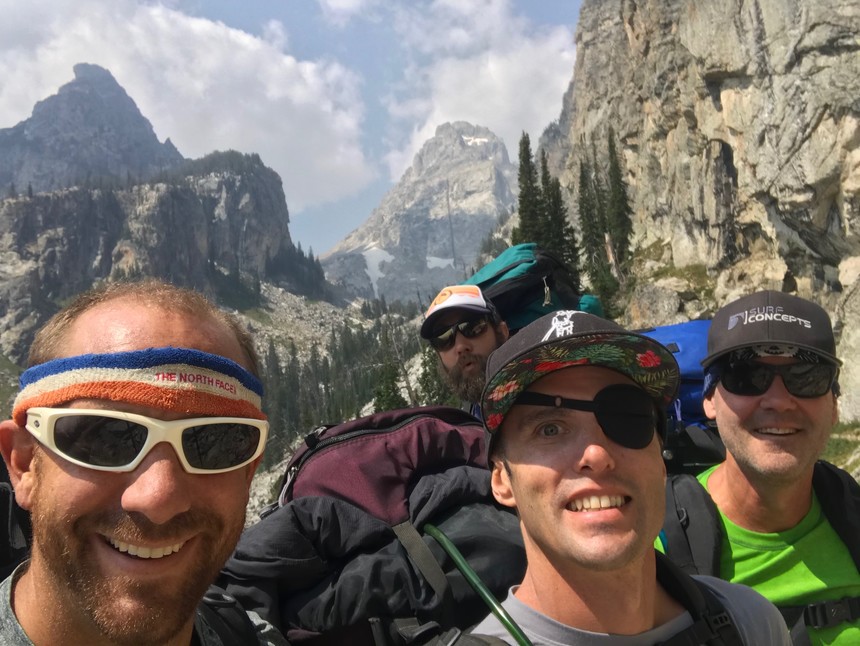
Tate decides to go for the Grand again, this time with a few friends.
After the difficult diagnosis in July 2017, Tate continued to train so that he would be able to try for the Grand the following summer. As he got stronger, so did his cancer. It seemed like every few months there was a new lesion somewhere else in his body.
By the beginning of August 2018, Tate was seeing double vision. He went to the doctor and found out that the cancer had progressed to his brain. That - combined with a tumor in his clavicle - was making his goal seem more like a pipe dream. In fact, he had every excuse in the world not to try to climb the Grand Teton again. The week before he was supposed to fly to Jackson, he was walking around his house with his chemo pump and grieving the loss of a good friend who had just passed from stomach cancer. Despite it all, Tate and Lora hopped on a standby flight to Jackson the afternoon after he was unhooked from the chemo.
“I was like let’s just go. I have to. It’s been a dream for two years. I have to take steps forward and not worry about the outcome,” he says.
On August 19, Tate and three of his closest friends started hiking. They camped at the Petzoldt Caves and woke at 2 a.m. to go for the summit. Tate wore an eye patch to remedy the double vision, and a steroid medication made it possible for him to wear a backpack despite the tumor in his chest. “I kind of Lance Armstrong-ed it a little bit,” he says.
Just 200 feet from the top, a storm moved in while Tate was stemming up the Sergeant’s Chimney, the last pitch of climbing on the Owen Spalding route. “It started snowing and I was sitting there with the eye patch and I was like, what am I doing? This is a terrible idea. That was the only moment where I thought this is just not something I should be doing right now.” Then he heard his friends above holler at him to hurry up, he felt a tug on the rope, and he kept climbing.
Tate reached the summit in sideways winds in the first snow of the season. And it was glorious. “It felt amazing,” He says. “Originally the plan was to get back to normal and beat cancer and climb a mountain. I guess now what it means to me is more than that. I was able to persevere through adversity and do it regardless of the disease, and side effects, and treatments. I had a short window to live life to fullest and I did it. Now going forward I have that confidence to say, of course I can do the next thing.”
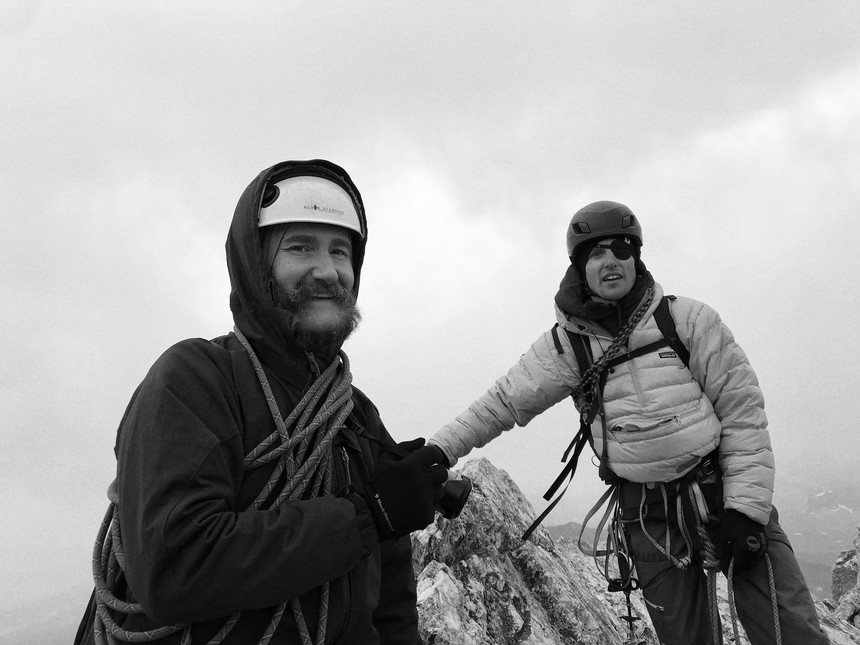
Tate summits the Grand Teton
One of the main reasons Brian and Tate wanted to share their stories is to encourage people to get colonoscopies at a younger age. A 2016 study by the American Cancer Society revealed that the death rate for colorectal cancer among adults aged 20 to 54 has been increasing since the mid-2000s. Many people often delay their first colorectal cancer screening due to the limitations of health insurance coverage of the procedure for those under 50. People should get checked earlier if they’re symptomatic. Being aware of the potential symptoms and knowing that a colonoscopy can help identify the problem are key.

